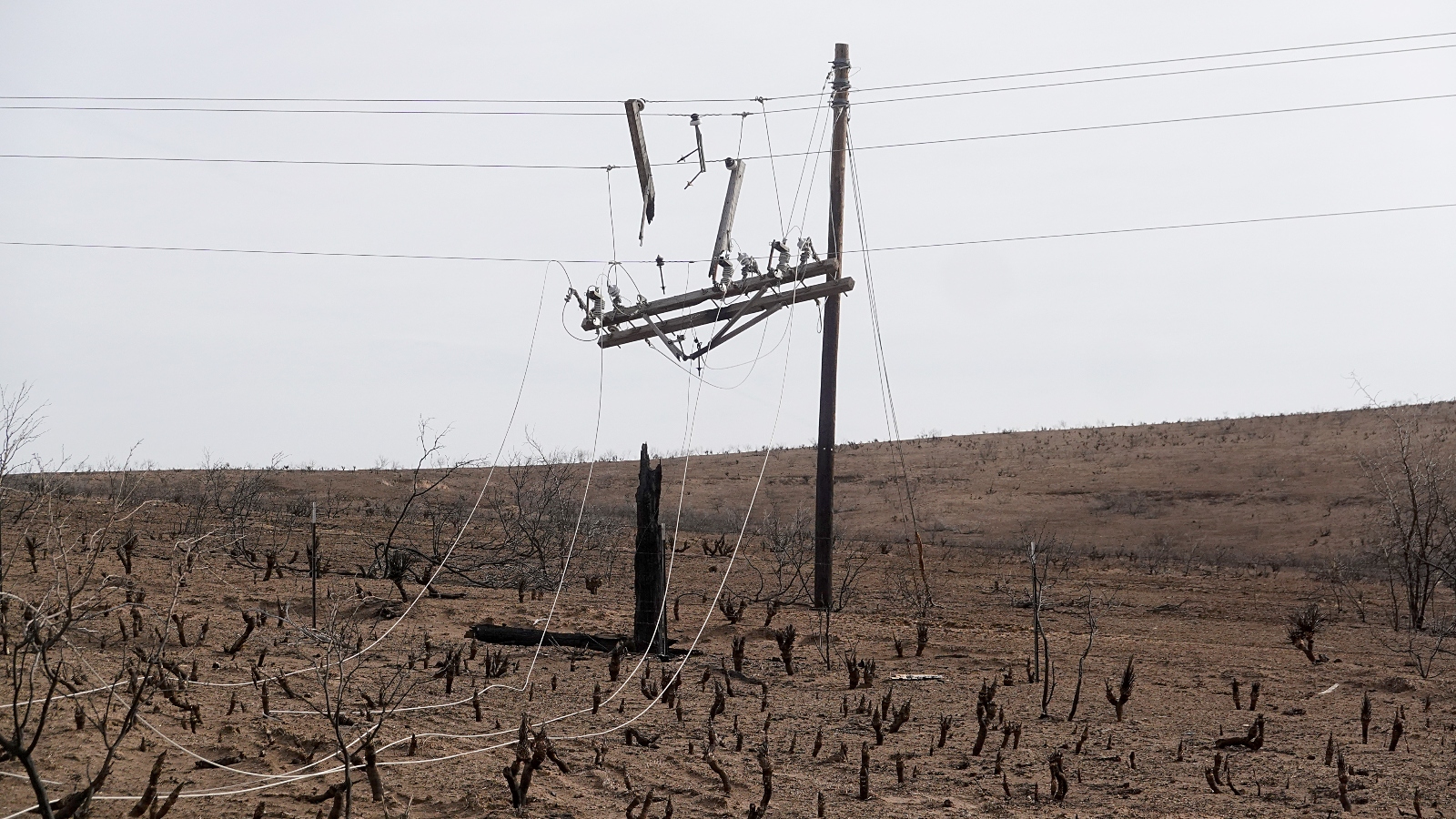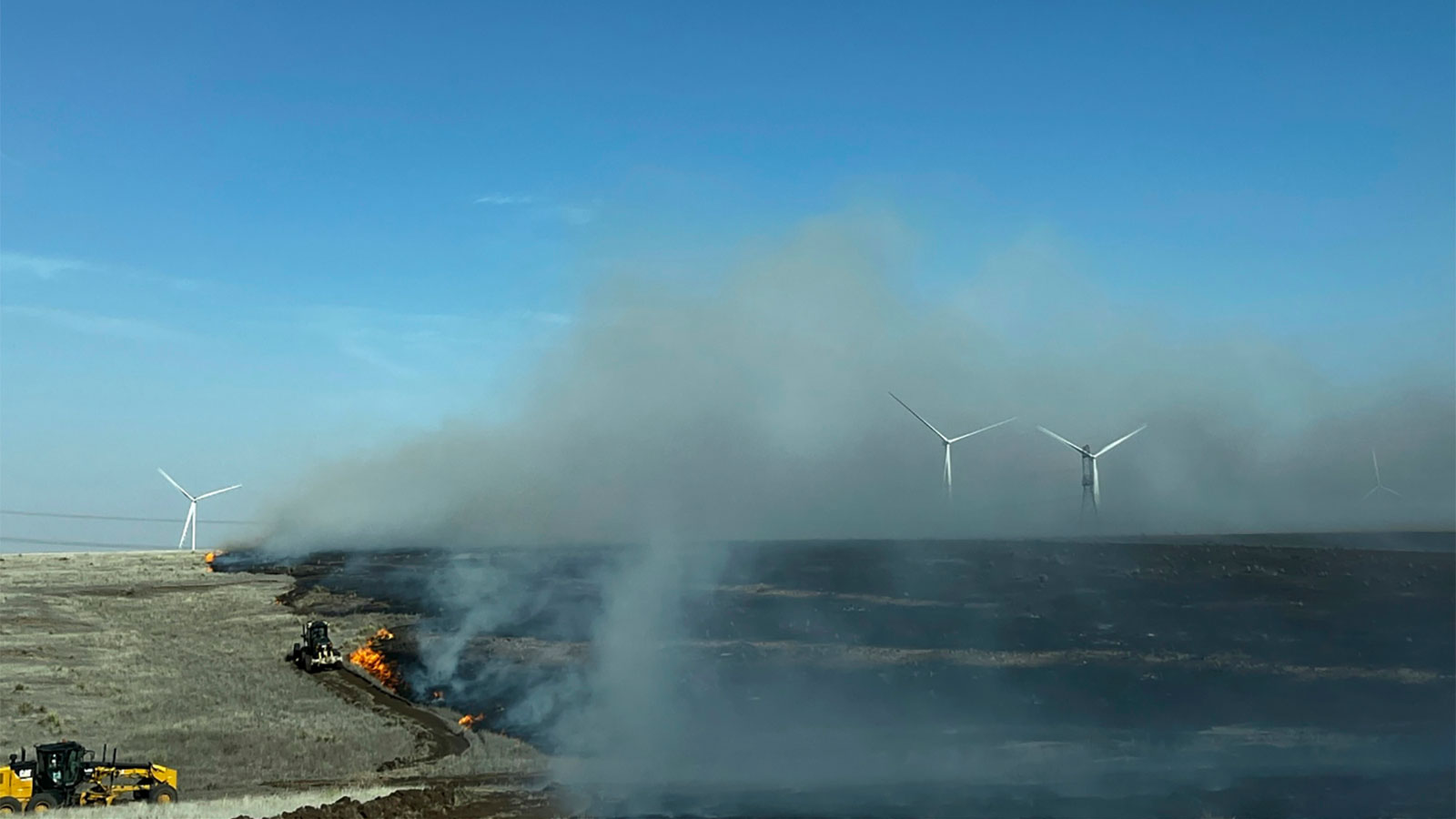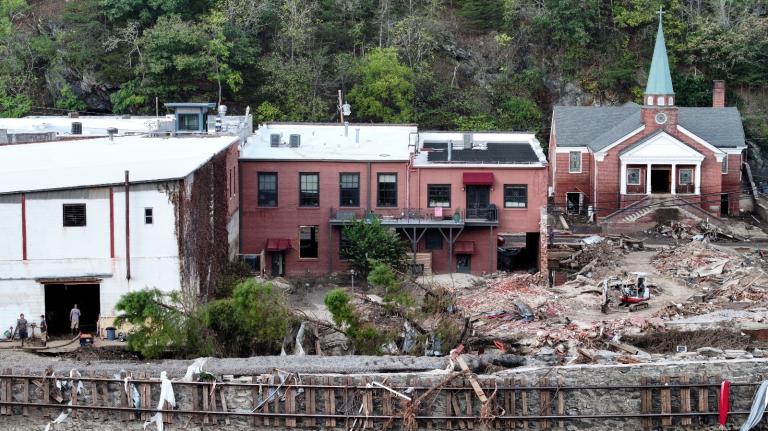As firefighters contained the largest wildfire in Texas history last week, the electricity provider for the state’s Panhandle region, Xcel Energy, announced some bad news: The wildfire, which burned more than a million acres of land and killed at least two people, seemed to have been caused by one of the utility’s electrical poles.
“Based on currently available information, Xcel Energy acknowledges that its facilities appear to have been involved in an ignition of the Smokehouse Creek fire,” the statement read, referring to the largest of several fires raging in the area. An investigation from the state’s forest management agency found that the fire began when a decayed wooden pole splintered and fell, sending sparks onto nearby grass. Photos obtained by Bloomberg News appear to show that the pole had been marked unsafe before the fire.
Seizing on this evidence, multiple landowners in the area have already filed lawsuits against the company — as have family members of the fire’s victims, seeking millions of dollars in damages. Xcel has denied that it was to blame for the historic fire: In the same statement, the utility said it “disputes claims that it acted negligently in maintaining and operating its infrastructure.”
The lawsuits are just the latest in a string of high-profile wildfire cases against major electrical utilities, whose flammable power lines are among the most common culprits for major fire events. California companies such as Pacific Gas & Electric and Southern California Edison have paid out billions of dollars to fire victims and insurance companies over the past decade. Earlier this month, a jury delivered a verdict against the Oregon utility PacifiCorp, which could owe victims billions of dollars. Xcel itself is fighting hundreds of lawsuits in Colorado over its similar role in the 2021 Marshall Fire near the city of Boulder. These lawsuits have hit utilities with huge charges that they have passed onto customers in the form of rate increases.
The emergence of the trend in Texas, a state that has avoided massive fire losses over recent years, underscores that wildfires are now a national threat to utilities, according to Karl Rábago, a former Texas utility regulator and expert on utility law.
“They’re not pivoting to the world in which we live,” he told Grist. “When we face these situations, we do have a legal system that will likely dole out a measure of pain. The sad thing is, after paying out a certain amount of money, the problem will become so ubiquitous, and so oft-repeating, that we will treat it as business as usual.”
As in many previous lawsuits, the question in Texas is what counts as negligence on the part of a utility. If the fact that Xcel knew the pole needed repairs but hadn’t yet repaired it is sufficient evidence of neglect, the company will likely be on the hook for a large share of the fire damages, which could amount to hundreds of millions. The state utility regulator requires companies to plan for emergencies, and Xcel has told the state in the past that it conducts rotating inspections of old poles. However, most experts agree that utilities need to do more, burying power lines or adding technology that allows for rapid and precise power shutoffs during fire weather.
“There is a recognizable negligence, at least, in the failure to ensure that the systems are not extremely vulnerable,” said Rábago. “If your pole [is] 40 years old, it’s probably gotten to be so weak that it’ll get knocked over in severe winds.” Other fires that broke out in the Texas Panhandle at the same time as the Smokehouse Creek Fire have also burned thousands of acres, but investigators haven’t yet determined the cause of those events.
Xcel declined to comment for this story.
Xcel’s subsidiary in the Texas Panhandle delivers power to around 400,000 customers over a vast and sparsely populated service area of around 50,000 square miles. Pacific Gas & Electric in California, by comparison, provides power to 16 million people across a service territory that isn’t much larger. On the other hand, the fire mostly burned open rangeland, destroying far fewer homes than the Marshall Fire or other urban blazes. That could keep the potential damages relatively low.
The Smokehouse Creek Fire and its companion blazes are the most devastating in Texas history, but there is some precedent for holding Lone Star State utilities accountable. Dozens of victims and insurance companies sued the much smaller Bluebonnet Electric Cooperative near Austin for failing to remove dead trees ahead of a 34,000-acre fire. The company and its tree-trimming contractor settled those cases over the following years, with the contractor paying $5 million as recently as 2020. The fire was the most destructive ever in Texas at the time, but the Panhandle complex is many times larger.
“The consequences of utility ignitions are larger than they used to be, and there’s an increasingly clear set of practices that utilities can take, which some do, to avoid these kinds of ignitions,” said Michael Wara, a senior research scholar at Stanford Law School and an expert on how climate change affects utilities. “This is creating a situation where juries are more likely to hold utilities liable when they cause these catastrophic fires, if they haven’t taken appropriate steps.”
Wara said the most cost-effective steps include installing more accurate weather stations and shutting off the power proactively during extreme weather events.
These lawsuits may become more common as climate change ratchets up the potential for massive fires in many parts of the country. The Texas Panhandle has always seen rangeland fires, but studies show that the state’s high plains now see an additional month of “fire weather” each year compared to the mid-20th century. The combination of high temperatures and high winds that started the Smokehouse Creek Fire will only get more common as the Earth continues to warm, which could mean more costly fires and more litigation.
Utilities in other states have responded to fire lawsuits by raising rates on customers and using the money to pay out settlements or upgrade their infrastructure. Most Texans purchase power through a controversial wholesale market that has come under criticism for jacking up prices during extreme weather, but Xcel’s system in the Panhandle isn’t part of that market, so the utility’s customers could see a direct rate increase depending on how the lawsuit shakes out.
The growing trend of utility lawsuits has started to make markets nervous. Warren Buffett, whose company Berkshire Hathaway owns the Oregon utility PacifiCorp, said in his annual letter to shareholders last month that “the regulatory climate in a few states has raised the specter of zero profitability or even bankruptcy … in what was once regarded as among the most stable industries in America.” The legendary investor referred to his failure to foresee this trouble as “a costly mistake.”
In an interesting twist, Buffett then speculated that this threat to utility profits may someday lead more areas to adopt public power models, where governments rather than corporations control electrical infrastructure.
“Eventually, voters, taxpayers, and users will decide which model they prefer,” he said.




